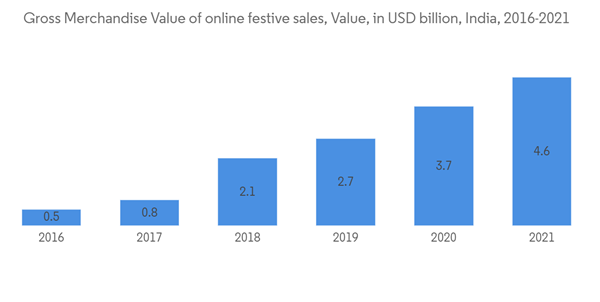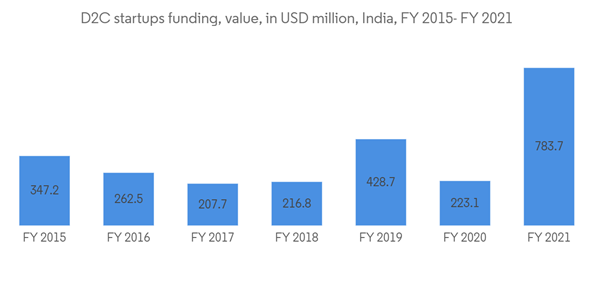Before the pandemic began, very few direct-to-consumer companies raised money, approximately 2-3 companies per week on average. With the spread of COVID-19 companies have started investing in the D2C models, and around 146 companies have raised a total of USD 500 million in the first half of 2020. With the change in consumer behavior due to COVID-19, more customers are turning online to purchase the products. The need to meet rising demand becomes more important. But most D2C sellers may lack the resources to manage end-to-end operations on their own. This is when they turn to third-party logistics and fulfilment companies for effective order administration, streamlined operations, and flawless shipment last-mile delivery. This is where efficient logistics companies and last mile delivery services are gaining prominence.
In fact, companies such as Shiprocket, Shipway, Pickrr, and others, D2C enablers, have helped hundreds of enterprises streamline these procedures in order to expand up swiftly. The growing D2C industry is expanding logistics potential and changing customer buying and delivery habits.
Key Market Trends
Festive Season and Mega Sales Driving the Market
Ecommerce marketplaces have begun to distribute their mega sales events throughout the year rather than focusing them solely on the Diwali or Dusshera festivals. D2C brands have their own events and promotions on their websites every fortnight or week, with higher discounts.However, their share of sales events on online marketplaces has increased. According to industry experts, direct-to-consumer (D2C) brands have grown nearly 200% in categories such as beauty, nutrition, and small electronics.
Many companies have recorded profits during times of mega sales. For instance, D2C latex mattress brand Morning Owl said that on day one of the mega sales by the eCommerce platforms saw a 200% spike in business. With nearly 6 million shoppers, the D2C stores on the Shoptimize platform saw a whopping 182% increase in revenue during the Diwali festive sales in 2021. While COVID-19 has accelerated the shift to online shopping, the holiday season has brought it ahead. In recent years, shoppers have purchased on marketplaces, taking advantage of favorable offers and sales.
The D2C brands aren’t too shying away from giving out attractive discounts. The discounts coupled with the customer’s expectations for next-day delivery or two-day delivery has the ecommerce industry players on their toes. While some D2C firms chose self-shipping of their items, the vast majority relied on advanced logistics partners to deliver their orders to clients. As a result, they began seeking for an ideal shipping partner who could provide them with a flawless logistical experience while also saving them money.
Investment on D2C Startups Growing in India
For the past few years, India's direct-to-consumer (D2C) category has experienced significant investment activity as eCommerce market conditions have matured and evolved. The relatively solid eCommerce infrastructure ecosystem in India, which includes eCommerce enablers, logistics, marketing, customer support, and other services, makes it easier for vertical or specialized eCommerce businesses to create new brands and build up. Indian D2C firms raised USD 783.7 million in the first seven months of 2021.Fashion brands have received the largest capital (USD 1.1 billion) among Indian D2C startups, with 65 unique fashion startups receiving investments between 2014 and July 2021. D2C fashion startups raised USD 336.5 million of the entire funding in 2021 alone, until July. Lenskart was a significant donor, raising USD 315 million in two offerings in 2021.
Beyond fashion, the direct-to-consumer (D2C) revolution is reshaping the FMCG business as well. D2C FMCG businesses have raised a total of USD 33.5 million in 139 deals since 2014. In 2021, such startups raised USD 321.3 million in total investment across 39 transactions. In 2021, Mamaearth and WOWSkin Science were prominent D2C FMCG firms that raised USD 50 million each.
Through a service fee model, Flipkart has launched a program to identify and build such digital-first brands on its platform. Under the Flipkart Boost program, the ecommerce giant will offer its expertise to early-stage brands in areas such as planning, advertising, cataloguing, logistics, quality control, and mentoring, as well as assist them in approaching venture funds to raise capital.
Competitive Landscape
The Indian D2C logistics market is competitive in nature. The market is expected to grow during the forecast period due to huge investments from the government. The industry consists of many local and international players, some of the companies include Delhivery, DHL eCommerce, Pickrr, Unicommerce, and Shiprocket, etc.Additional Benefits:
- The market estimate (ME) sheet in Excel format
- 3 months of analyst support
This product will be delivered within 2 business days.
Table of Contents
Companies Mentioned (Partial List)
A selection of companies mentioned in this report includes, but is not limited to:
- Delhivery
- DHL E-commerce
- Shiprocket
- Unicommerce
- Pickrr
- Shipyaari
- Shipway
- Shadowfax
- Gati Ltd
- Ecom Express*










